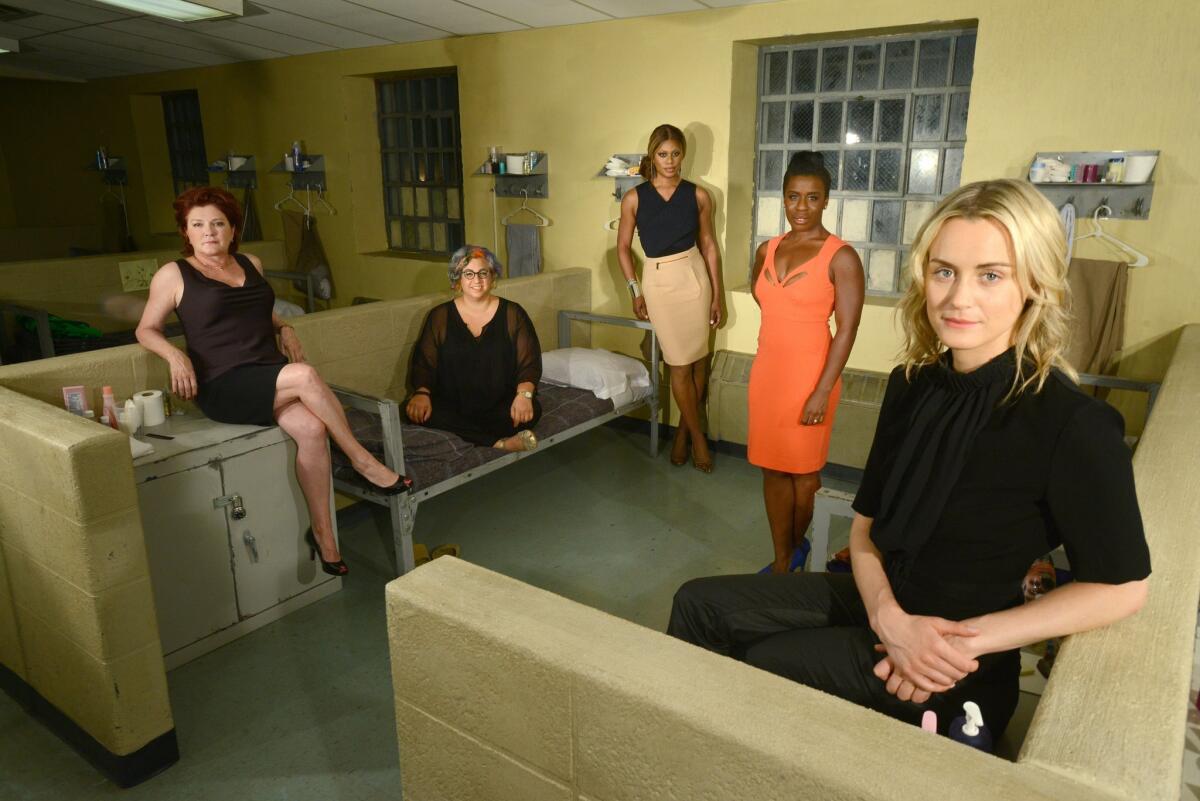‘Orange Is the New Black’ cast unlocks secrets to the show

Reporting from New York — For a show about locking women away, “Orange Is the New Black” has had a remarkably freeing effect on the television industry. With solid ratings and 12 nominations heading into this month’s Emmy Awards, the Netflix series has, in just two seasons, provided rock-solid proof that female-dominant ensemble shows are catnip to viewers and critics alike. The Envelope got a day pass to sit down with most of the show’s nominees — creator Jenji Kohan and actresses Taylor Schilling (Piper), Kate Mulgrew (Red), Uzo Aduba (Crazy Eyes) and Laverne Cox (Sophia) — on the show’s set, which films at Kaufman-Astoria Studios in Queens, N.Y. Here’s how the girl talk went:
Congratulations on being agents of prison reform, by the way; a law enforcement official in Michigan has declared orange prison-wear too cool, so they’re going back to stripes.
Aduba: You’re kidding!
Kohan: He said letting them wear orange lends empathy to inmates. God forbid we should empathize with inmates.
Cox: Oh, we can’t do that. They’re not really human beings.
I imagine this is a pretty fun set to work on. Or are you all serious Method actresses who never break character?
Cox: I did grow up African Methodist Episcopal, but I don’t think of myself as “Method-ist.”
[Groans all around.]
Schilling: We do have a natural rapport with one another. It’s like we all signed this contract we’ve never spoken of.
Mulgrew: It’s a joyful kind of … greed. We want, we want, we want more.
Kohan: No one is slacking, so if you’re the one who isn’t bringing it — it shows.
Mulgrew: I’m always moved by the simplicity and authenticity, and working out every small thing, fixing it until it works.
Male-dominant sets have a tendency to get super macho. What’s the result of having a set full of women?
Aduba: In my lifetime, I have only had two artistic experiences that were entirely female dominated. In both of those areas, they’ve cut into the marrow of my spirit and soul. It’s about being part of something that’s authentic, being in a female-driven experience that is truly at heart seeking out the kernel of truth and is in support of women.
Mulgrew: That kernel must exist in the imagination of the creator. If it doesn’t exist there, it cannot be transferred. I don’t care if you bring in genius actors.
Schilling: This has changed my life in every capacity, this whole experience. Personally and professionally. So many courageous people have come together to say we have the same goal, the same aims — we’re telling the same story.
Kohan: But it becomes a dance: I hear your voices in my head. I’m a little schizophrenic. It’s become this symbiotic experience where we feed off of each other and I hear your characters and voices. We have your pictures on the walls [of the writers’ room], and you have become the characters now.
Cox: I would love to be in the writers’ room. That’s one of my dreams.
Kohan: That will never happen. If you sat as a fly on the wall it wouldn’t be the same experience. Part of it is that we’re this kind of secret cabal.
Schilling: I don’t want to know how the sausage is made.
Do any of you know anyone who is incarcerated? Have you ever gotten feedback from them about the show, or have you asked them for advice?
Cox: This woman came up behind me: “I was in prison!” I asked if it was true to her experience. She said, “Yes, we laughed like that. We got crazy like that.”
Aduba: I know someone in prison. I would compare his story to the [character Janae’s] story — someone who was on the right track, graduated cum laude. He started making some choices I will never understand. It was a very odd experience, but I understood Janae better [from that]. There was this cool factor, the thrill of it.
What’s your strongest memory of auditioning for the show?
Mulgrew: I was given only two little pages; I think it was indicated at the top that she was a Russian woman who had been inside for many years. But it was a mere suggestion. When that came into my imagination, — the Red I do now [slips into Russian accent] is an odd thing, a kismet thing — that’s what was intended. It was a moment of magic.
Schilling: I had a similar experience to Kate: The ease with which Piper fit was extraordinary in my experience. I read the script and little doors in my imagination started opening of their own accord.
Aduba: I auditioned for another part. I auditioned for Janae.
Kohan: And I loved her and called [casting director] Jen Euston and said, “Tell her she’s not right for this, but she will be in the show. Tell her she got the job.”
Schilling: Sometimes I feel like I should be working harder. But Jenji said when it’s right, it’s easy. When it’s right, it just goes easy.
Sign up for the Envelope Newsletter
More to Read
From the Oscars to the Emmys.
Get the Envelope newsletter for exclusive awards season coverage, behind-the-scenes stories from the Envelope podcast and columnist Glenn Whipp’s must-read analysis.
You may occasionally receive promotional content from the Los Angeles Times.










